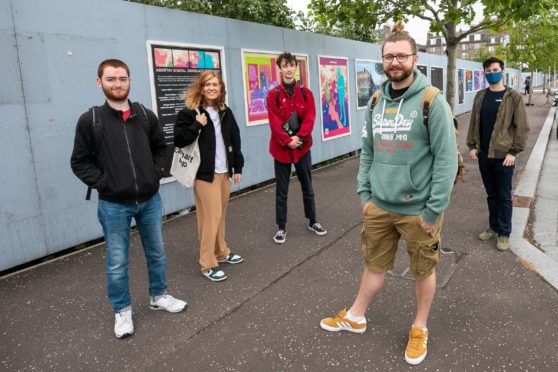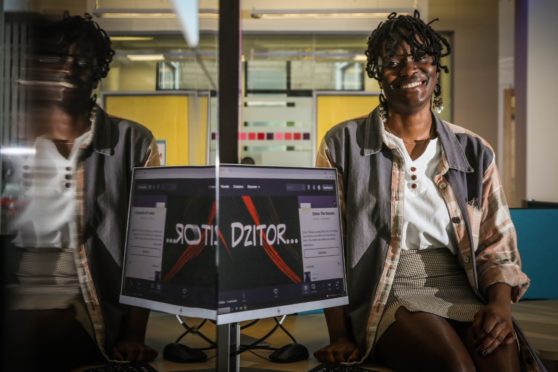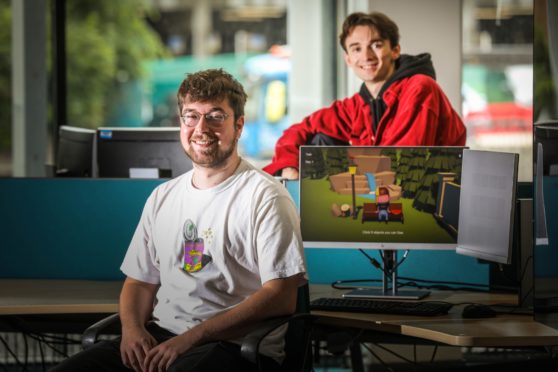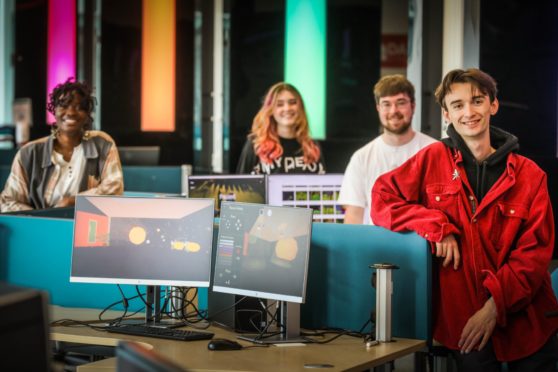They’ve created everything from video games with frog-filled planets to webcomics of wandering goddesses, but this year’s cohort of Abertay University graduates are offering us more than just fun and games.
At this year’s Abertay Digital Graduate Show, School of Design and Informatics students will showcase projects including a game that helps people manage their mental health, as well as research advocating for victims of smarthome-aided domestic abuse.
The show, which will be launched with a small in-person event at V&A Dundee this evening, will exhibit more than 100 pieces of work online until August 8.
Dean of School, Professor Gregor White, said: “The work produced by this year’s cohort is of outstanding quality and I’m delighted we are able to share the Abertay Digital Graduate Show online and with a small in-person audience.
“The pandemic has thrown up so many obstacles for our students, but all have risen to the challenge to produce innovative, original and high-quality work for their final projects.”
Ahead of the launch, we caught up with four final-year students about their projects, keeping up creativity in isolation, and dealing with their degree show going digital.
Senanu Tordzo
Computer artist Senanu Tordzo, 21, says: “I feel like when things are online, it doesn’t feel like it’s real. But I think it’s also a new and kind of exciting prospect, to see how things will develop now that Covid has changed everything.”
Senanu explains that her project, an animated webcomic called Dzitor The Wandering Goddess, is “a reflection of how I had also found my place here in Scotland as an immigrant, coming from a completely different culture”.
Originally from Ghana, she used West African folklore and Scottish history to help her shape Dzitor’s story.
“I discovered that as a West African, my culture is greatly intertwined with Glaswegian history in particular,” she says. “And it brought me closer to Scotland, in a way.”
As a West African, my culture is greatly intertwined with Glaswegian history.”
For Senanu, shining a light on Black creators and shifting away from Western media to present new stories is at the heart of her work.
“I do feel like representation is getting better, especially after the Black Lives Matter movement last year,” she says. “But though it is getting better, it also seems that it’s a trend currently.
“So my goal is to try and bring attention to the fact that these are people’s lives that are being affected.”
Sam Grant
For Carnoustie-born game designer Sam Grant, the road has been lonely, but the launch of the digital degree show is an excuse to get excited.
“It’s something I’m really looking forward to, having an event to go to after a year and a half,” he laughs.
His final project, Sonder – a word which means “the realisation that each random passer-by is living a life as vivid and complex as your own” – is a video game which aims to teach the player Cognitive Behavioural Therapy techniques.
“I wanted to try and make a positive difference in the world as a game designer, which is quite difficult,” Sam, 23, explains.
“I thought, ‘What if games were actually designed to help people with their mental health?’.”
Taking on psychology research as well as the design of the game itself, Sam went the extra mile to make his game a resource for anyone who needed it.
“I got in touch with a psychologist, ran it by him, asked him some questions I had about the treatment and the project in general,” he says.
“So the first lesson was about cognitive restructuring, which was looking at your thoughts and your opinions of yourself and correcting them, and not taking them as true facts.”
Kayleigh Gall
“It’s such an obvious thing that no one thinks about,” says ethical hacker Kayleigh Gall, 20, about her project, an Investigation Into Countermeasures Against Smarthome Technology-Facilitated Abuse. Or, for the less tech-savvy – ways to stop domestic abusers using smart locks, plugs, and remote heating and sound systems to their advantage.
“I was looking at adverts for smarthome locks on doors, and looking at it through the eyes of ‘how could this product be used to hurt someone?’ makes you realise how dangerous a lot of the features are,” explains Dundee-born Kayleigh.
“So making someone uncomfortable with the heating, or maybe playing music really loudly, or locking doors – anything like that would be considered harassment, because it’s making the person uncomfortable in their own home, remotely.”
Small changes, which you maybe wouldn’t consider would impact people very much, but would make a lot of difference for victims of domestic abuse.”
Impassioned by the fact real people’s wellbeing is at stake, Kayleigh wanted to investigate how this kind of abuse could be prevented at the source.
“When I was doing my research, a lot of the focus was on how awareness can be raised and what victims can look out for. Whereas, I didn’t find many things that were focused on what can actually be done to stop the things happening in the first place.
“So I wanted to push for that to be looked at more, and for the responsibility of that to be put on to the people who make the products, rather than the victims.”
Thomas Crowe
Meanwhile Thomas Crowe, 22, from Glasgow, created a video game called Yazz which allows players to get a taste of a recording studio – without the fancy equipment.
“I’ve always had a passion for recording music, and I really wanted to bring music production to players who may not have been able to experience that,” he explains.
Yazz combines a frog-filled interplanetary adventure with music-making, for a fun and approachable way into recording.
“You record to these musical layers, which are all separate instruments and make up a track in the end,” Thomas says.
“And I likened that to a cake, where you’ve got different layers of music that make up the final cake!”
Bound for a game designer job at Ubisoft in September, Thomas praises the way the university handled the pandemic and kept up support for the students.
“I think Abertay did an especially good job, in my course at least, in allowing me to reach out to lecturers whenever I wanted, book calls for future jobs or current work,” he says.
And for the moment, he’s just excited to get to see the V&A launch of the digital degree show.
“It’ll be the first time I’ve worn a suit in the past two years,” he laughs. “So that’ll be a change, but it’ll be really great!”
The launch event for this year’s Abertay Digital Graduate show takes place from 8pm on June 25.
Related articles:












